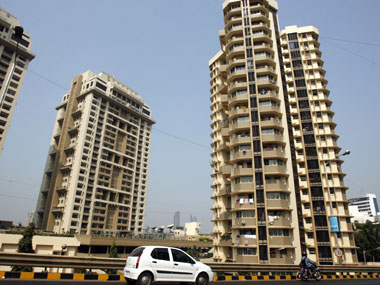In the new rights-based entitlement economy that the Congress-led UPA is building, we have big money being spent on schemes to ensure rural jobs, food security, education, and - coming up next - universal health coverage.
The poor must have first charge on a society’s resources, and thus no one should grudge them these essentials - even though at Firstpost we believe that these schemes are horribly expensive political palliatives rather than genuine cures.
However, one area where you won’t see much action is on the concerns of the middle class - which has access to essentials like roti and kapda, but often not makaan.
One suspects that it is the makaan-lacking middle class that forms a significant chunk of Anna Hazare’s angry backers in his anti-corruption crusade - and this is precisely the reason why the Congress and many other political parties are fighting the Lokpal tooth-and-nail.
Real estate, mining and infrastructure projects are where politicians make their big money. Consider the names: Sharad Pawar, BS Yeddyurappa, Madhu Koda, Digambar Kamat, the late YS Rajasekhara Reddy and his son Jagan Reddy, to name just a few. The Commonwealth scam involved crores of mis-investment in real estate projects. Delhi CM Sheila Dikshit’s son was found carrying cash for a real estate deal (allegedly on behalf of a friend). Even Sonia Gandhi’s son-in-law is involved in a realty businesses.
All of the UPA’s big initiatives thus significantly impact the real estate sector - to the loss of the middle class. Whether it is the Land Acquisition Bill , the Mining and Minerals Bill or FDI in retail - all these have a strong real estate component which will jack up the cost of owning a house for the middle class. The politician will gain more than the middle class.
If Anna Hazare ever gets his Lokpal Bill the way he wants it, real estate is where the first crusades will lead.
If Sonia Gandhi is sincere about producing a “fabulous” anti-corruption legislation, she should focus on this one sector.
But she probably won’t. Because the political interests of the Congress (with its accent on the rural vote) and other politicians collides those of Anna’s middle class.
The middle class wants a powerful antidote to everyday corruption that stands in the way of its aspirations. For the Congress, the big priority is not the middle class’ concerns about corruption and housing, but how to spend more taxpayer money to buy its poor voters - which will invariably stoke further corruption.
Of course, the Congress does not want to lose the middle class vote in cities. This is why it is reluctant to raise petrol prices or cooking gas prices - as a form of compensation.
Instead of bringing real estate prices down by freeing up land use and investing in public transport, all governments have been busy subsidising private passenger transport instead. So, if you can’t afford a house, buy a two-wheeler or a car to take you home. Again, a palliative, not a solution.
India’s big-ticket corruption begins and flowers through urban real estate. Between them, politicians, bureaucrats, big business and the land mafia control the real estate market in most metros and urban areas to the point where no one - barring the super-rich - can really afford to own a roof over his head.
In most cities, owning a house means being at least a crorepati. The real middle class has, over the last five years, been systematically excluded from home ownership by a speculator-driven push to property prices - obviously to benefit politicians who have money invested here.
According to real estate research firm Liases Foras, 52 percent of the flats bought in Mumbai are owned by investors - and not by those who want to stay in them. “Investors” is largely a euphemism for benami political owners who merely want to cash in on speculative price appreciation.
The good news is that excessive corruption and the economic slowdown is now beginning to bite the realty sector even without the Lokpal getting into the act. In recent weeks, newspapers have been running sharp headlines indicating a sharp fall in property sales in the metros, with predictions of a 20-30 percent drop in prices in 2012 in many places.
Real estate shares have been the real scam story on the bourses. Between January 2008 and now, the BSE Realty index has fallen to one-tenth its value - it has destroyed 90 percent of its peak value, when the broad market has fallen by less than a third.
However, despite the headlines - Hindustan Times predicts a 20-30 percent fall in Delhi real estate prices, and The Economic Times reports a 20 percent dip in property registrations in Mumbai in November, a 31-month low - what stands out is the paradox: even though stock market investors and private equity funders are bailing out , actual houses are still unaffordable.
The fact that it is cheaper even today to own a house in Dubai or London than in Mumbai tells its own story. In the US, property prices can crash after a meltdown because the real estate market is not rigged. In India it is rigged by politicians and builders.
According to the Hindustan Times, the “balance-sheets of India’s top 10 listed developers revealed a massive oversupply and a slowdown in sales: they are sitting on an estimated Rs 31,000 crore worth of unsold properties.”
But prices are still unaffordable.
There is only one explanation. Politicians are the ones holding up prices - because a price crash would wipe out the value of their slush funds.
There is only one way to defeat the land mafia and curb the black money hidden in property: the government should nationalise all unsold public and private land and properties under a Housing Security Act. The land so acquired should be leased back for 99 years for the construction of houses for both the poor and the middle classes on the basis of open bidding.
When actual construction costs range from well under Rs 1,000 per sq ft for basic houses and under Rs 2,000 for even fancy ones, there is no logic in making property affordable only to the rich by pricing them at 5,000-10,000 per sq ft.
Given the political investment in the realty sector, I don’t expect a housing security bill anytime soon. And yes, one needn’t weep for the realty sector just because property prices are weak.


)




)
)
)
)
)
)
)
)